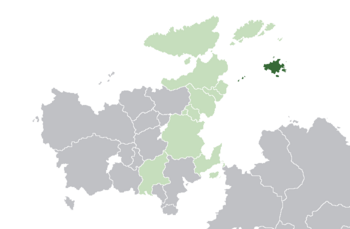Varienland: Difference between revisions
No edit summary |
No edit summary |
||
| Line 64: | Line 64: | ||
|area_label2 = | |area_label2 = | ||
|area_dabodyalign = | |area_dabodyalign = | ||
|population_estimate = 7, | |population_estimate = 7,700,000 | ||
|population_estimate_rank = | |population_estimate_rank = | ||
|population_estimate_year = 2019 | |population_estimate_year = 2019 | ||
Revision as of 11:57, 28 July 2019
This article is incomplete because it is pending further input from participants, or it is a work-in-progress by one author. Please comment on this article's talk page to share your input, comments and questions. Note: To contribute to this article, you may need to seek help from the author(s) of this page. |
Kingdom of Varienland Kongeriget Varienland Königreich Warienland | |
|---|---|
|
Flag | |
| Motto: "Styrke gennem enhed" "Strength through unity" | |
| Anthem: "Mit gamle fædreland" "My old fatherland" | |
 | |
| Capital and largest city | |
| Official languages | Varienish, Weranian |
| Demonym(s) |
|
| Government | Unitary parliamentary constitutional monarchy |
• Monarch | Georg-Frederik IV |
| Nils H. Thornbæk | |
| Legislature | Rigsdag |
| Establishment | |
• Unification of Varienland | 1040 CE |
| Area | |
• | 90,819 km2 (35,065 sq mi) |
| Population | |
• 2019 estimate | 7,700,000 |
• 2014 census | 7,538,726 |
• Density | 83.01/km2 (215.0/sq mi) |
| GDP (PPP) | 2018 estimate |
• Total | $407,956 billion |
• Per capita | $51,640 |
| GDP (nominal) | 2018 estimate |
• Total | $412,956 billion |
• Per capita | $52,272 |
| Gini (2018) | low |
| HDI (2018) | very high |
| Currency | Rigsdaler (RGD (RD)) |
| Time zone | Euclean Standard Time |
| Date format | dd-mm-yy |
| Driving side | left |
| Calling code | +47 |
| ISO 3166 code | VRL |
| Internet TLD | .vl |
Varienland (Weranian: Warienland) officially the Kingdom of Varienland is a Sovereign state located off the north-eastern coast of Euclea. Varienland consists of an archipelago with around two hundred inhabited islands, the largest being Vejrland, Jerø and Hellerø. Varienland enjoys a temperate climate with a relatively flat, but rocky coast with an exception in the somewhat hilly north, and sandy beaches on some of the smaller islands. Varienland has a total area of 90,819km2, and a population of 7,9 million (as of 2018)
The Varienlander Archipelago was initially settled by Tenic peoples until the arrival of the Varien and Heter tribes in 480. These new tribes quickly assimilated the Tenic, and by 900 trade and commerce with the continent flourished. Varienlander Jarldoms would launch expeditions across the sea to raid, trade and settle wherever it was beneficial. The Jarls of Brønne conquered Vejrland in 1030 and were generally recongnized as the first rulers of a united Varienland in 1040. Around the same time influences from Euclea led to the eventual spread of Sotiranity to the islands, which was adopted by king Canute I in 1074. During the Amendist schism Varienland adopted Amendism mostly due to the prospect of seizing the church land. Varienland emerged as a naval power out of necessity to protect the home islands, and project power abroad. Varienland was a minor colonial power, sending expeditions and establishing forts in several areas, but never managed to establish a proper foothold, and most areas were sold off or abandoned. In the latter half of the 20th century Varienland went through social and labour market reforms enabling the present welfare state model and a mixed economy.
The constitution of Varienland was signed in 1847 ending absolutism in the country. It established a constitutional monarchy and with later amendments parliamentarism in 1878. Weranian, was made an official language in 1957 and the language is today equal in status to Varienish. The government and national parliament are situated in Rosenborg, the nations capital, largest city and main commercial hub.
